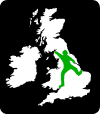
- The most recent issue to be published was 133
- For further information, please see Publishing/Despatch Schedule
- Database last updated on Sun, 25 Jan 2026 16:24:22 +0000
- Online access is currently available for all issues. Some of
the older issues are bit-map scans rather than digital copies.
journal scans.
- Online voting for CREG articles was withdrawn in June 2022. For info see
Voting for CREG articles
Contents of journal 106
June 2019
This page may take a few
seconds to load. Please wait ...
- CREG Journal 106 (0-24)
(PDF 5.9MB)
  Individual articles may be available below Individual articles may be available below
- This issue has a cover date of June 2019 and was published on 1 June 2019.
-
- Front Cover (1)
(PDF 1.8MB)

- Guy Van Rentergem using his improved smoke generator to visualize the flow of CO2 from the entrance of Cueva de la Muerte (Cave of Death), Costa Rica. Photo: Keith Christenson.
-
- Contents (2)
(PDF 223KB)

- List of contents and masthead information. CREG Field Meetings.
-
- Detecting Gasses Underground: a Practical Guide for Safety and Scientific Study (3-6)
(PDF 486KB)

- Mike Bedford considers the types of gasses that might be detected in caves, mines, and other underground spaces, and investigates methods of detection.
-
- Carbon Dioxide Data Logging in Caves – Part 2 (7-10)
(PDF 1.1MB)

- In the second of this short series, Ian Cooper and Bob Mehew provide full details of their CO2 data logging device, including an electronic circuit diagram and photographs of the physical implementation.
-
- Building Blocks (11)
(PDF 289KB)

- Sourcing hardware – balancing value, convenience and quality, by Tony Haigh.
-
- An Android App using Phone Angle Sensors for Radiolocation Depth Determination (12)
(PDF 316KB)

- Jim Rattray introduces the Android phone app that he created, using App Inventor 2, which measures the null angle of a radiolocation loop antenna and thereby calculates the depth from the measured distance to ground zero.
-
- An Android Scientific Calculator for Depth Calculation in Radiolocation (13-14)
(PDF 684KB)

- Juan L. Ronda describes his use of an advanced off-the-shelf scientific calculator app for determining the depth in radiolocation exercises. He also discusses the use of an electronic inclinometer to measure the angle of null.
-
- Web Watch (14)
(PDF 304KB)

- Peter Ludwig identifies another collection of interesting sites, which are sure to be of interest to those of an inquisitive disposition...
-
- High-speed Data Links over Copper Conductors for Harsh Terrain Applications (15-16)
(PDF 512KB)

- In situations where a high data rate is required, a cabled solution using robust copper cable may be appropriate. Tony Haigh & Alec Umansky consider a family of products using HSDSL technology providing a range of over 10km.
-
- We Hear (17)
(PDF 473KB)

- Roundup of news and events – Mike Bedford brings us the latest to impact the world of cave radio and electronics. New Lease of Life for NiMH Batteries, Amateur Radio in the Frequency Basement, Headset Attached to the Back Teeth.
-
- BCRA Field Meeting at the British Cave Monitoring Centre (18-19)
(PDF 329KB)

- Based at Poole’s Cavern in Derbyshire, the British Cave Monitoring Centre is now up and running. BCRA arranged a field meeting to introduce this valuable facility for cave science research. John Gunn, Andi Smith, Andy Hall and John Wilcock outline the day’s events.
-
- The Role of GIS in Finding New Caves (20-22)
(PDF 791KB)

- Following his description of how multiple geophysical methods are being used to find new caves, Atanas Rusev discusses the use of geographical information systems in cave exploration.
-
- An Improved Smoke Generator for the Visualization of Airflow in Caves (23-24)
(PDF 833KB)

- Recent methods for visualizing airflow in caves have generally involved aerosol-based ‘haze’ and ‘smoke’ products used in photography and theatrical effects, or simply burning incense sticks. The former cannot be carried on aircraft, and the latter produce too little smoke for visualizing large volumes of airflow. Guy Van Rentergem describes a cave-ruggedized smoke generator, based on e-cigarette technology.
-
- The Adventures of GREG (24)
(PDF 720KB)

- Illustration by Adrian Higgins, and words by Mike Bedford.
-

|

View Contents:

BCRA is a UK registered charity and is a constituent body of
the British Caving Association,
undertaking charitable activities on behalf of the BCA.
BCRA publishes a range of periodicals and books.
Click here for further information.
|
Searching
To Search our pages using Google, type a search
string in the box at the top of the page and hit your Return key
You can also search our publications catalogue at the British Caving Library
The CREG Journal Search Engine is a new, powerful search engine which will, sometime, be extended
to cover Cave & Karst Science. We have a keyword search facility on our Cave Science Indexes pages but this may be rather out-of-date.
|
For staff use: Link to Database
Show/Hide
download figures next to each item (if available and non-zero; you might need to refresh page first). Counters last
reset on Thu 03-Jan-2019 17:29:28 +00:00. The figures are non-unique
click-throughs.
|









